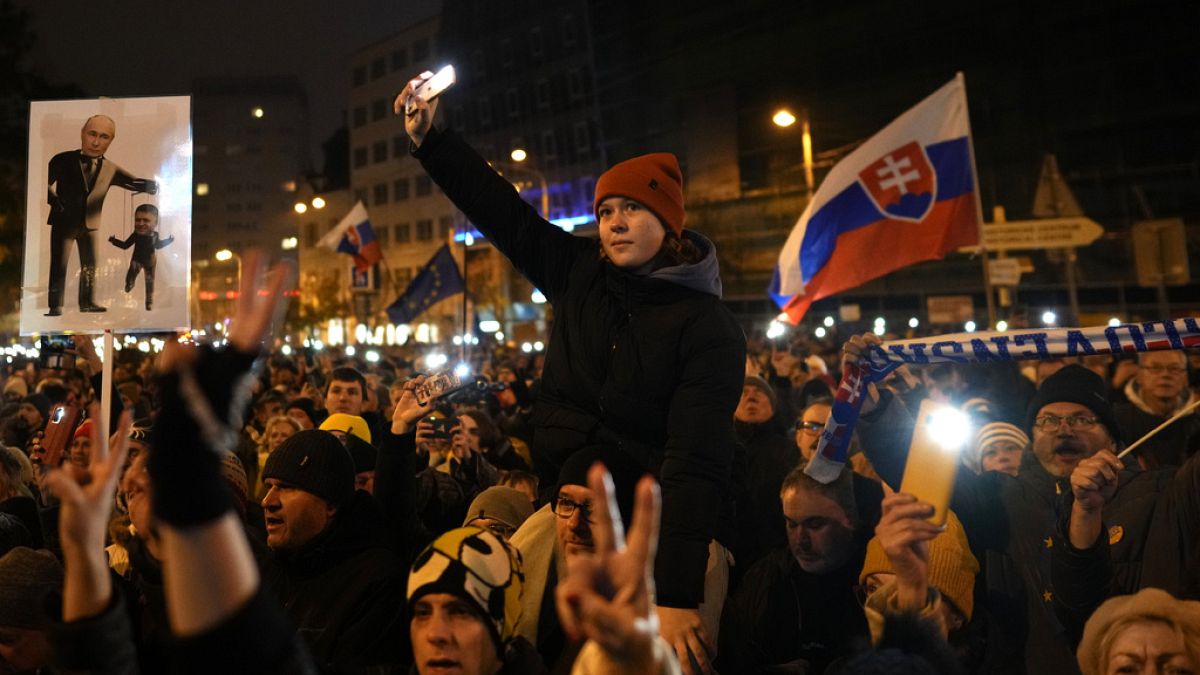On Friday, protesters took to the streets in Bratislava, the capital of Slovakia, to express their discontent over Prime Minister Robert Fico’s pro-Moscow stance. The demonstration came in the wake of Fico’s meeting with Russian President Vladimir Putin and his recent threat to cut financial aid to Ukrainian refugees residing in Slovakia. The decision to cut aid was made in response to Ukraine’s refusal to allow the delivery of Russian gas to Slovakia through its territory. Around 4,000 people participated in the protest, waving EU and Slovak flags, and holding signs with slogans denouncing Fico’s actions. One protester, Lucia Štasselova, condemned Fico for potentially succumbing to Russian political influence, calling his behavior audacious.
Fico’s meeting with Putin in Moscow on December 22nd was focused on discussions regarding gas supplies, with Moscow considering Slovakia as a potential neutral ground for peace talks on the conflict in Ukraine. Following the breakdown of gas exports through Ukraine on January 1st, tensions between Slovakia and Ukraine escalated. The dispute arose as Ukraine decided not to renew a pre-existing transit agreement with Russia’s Gazprom, leading to the halt in gas deliveries through Ukrainian pipelines. Fico, who heavily relies on Russian gas, warned of the economic repercussions for Slovakia if the energy deal was not renewed. In response, he threatened to cut electricity supplies to Ukraine and demanded either the resumption of gas transits or compensation for the financial losses Slovakia incurred due to the disruption in gas supply.
The protests in Bratislava highlighted growing concerns within Slovakia over Fico’s close ties to Russia and his willingness to jeopardize relations with Ukraine. Participants voiced their opposition to Fico’s alignment with Moscow, emphasizing their identification with Europe and rejecting any Russian influence over their country. The protesters expressed solidarity with Ukrainian refugees and condemned Fico’s decision to consider cutting aid to those in need. The demonstration culminated with the chanting of the Slovak national anthem, underscoring the protesters’ patriotism and determination to protect their country’s sovereignty from external interference.
Fico’s controversial stance on the gas supply issue has put Slovakia in a delicate position, caught between the interests of Russia and Ukraine. The prime minister’s eagerness to maintain close relations with Moscow has raised concerns both domestically and internationally, with critics accusing him of prioritizing economic considerations over political principles. Slovakia’s intricate energy dependence on Russian gas complicates the situation further, as any disruption in the gas supply could have significant implications for the country’s economy and energy security. Fico’s confrontational approach towards Ukraine underscores the challenges of balancing national interests with regional dynamics in a volatile geopolitical environment.
The protest in Bratislava represents a manifestation of public dissatisfaction with Fico’s policies and his handling of the gas supply crisis. The demonstrators’ calls for independence from Russian influence and solidarity with Ukraine reflect broader sentiments within the Slovakian society, which values its European identity and democratic principles. Fico’s willingness to engage with Putin and potentially sacrifice aid to Ukrainian refugees has sparked outrage among citizens, who view these actions as a betrayal of Slovakia’s values and interests. The protest serves as a reminder of the importance of transparency, accountability, and adherence to democratic norms in governance, as well as the need for political leaders to prioritize the welfare of their citizens over geopolitical alliances.
In conclusion, the protest against Prime Minister Fico in Bratislava sheds light on the complex geopolitical challenges facing Slovakia, as it navigates between competing interests in the region. The public outcry against Fico’s pro-Moscow stance and his threat to undermine aid to Ukrainian refugees underscores the deep-seated concerns within Slovakian society regarding national sovereignty and European integration. The demonstration underscores the importance of civic engagement and the power of collective action in holding political leaders accountable for their decisions. As Slovakia grapples with the repercussions of the gas supply dispute and the broader implications of its foreign policy choices, the protest serves as a powerful statement of defiance against external pressures and a reaffirmation of Slovakia’s commitment to its European identity and democratic values.











